Shkarin upgrades silver to gold; Iran wins 2 at U17 Worlds
Tuesday, August 20, 2024 - 20:32 By Vinay Siwach

AMMAN, Jordan (August 20) -- Mikhail SHKARIN (AIN) has lost only one bout in his international career. The loss in the U17 World Championships final at 80kg last year was so devasting for Shkarin that he made his goal to win the gold medal this year. He doubled his training time, watched videos of his bouts repeatedly and came to Amman with a mindset of a winner.
It was a similar path to the final this year as he won two close bouts, a 9-0 win in the semifinals and faced an Asian opponent in the final. The only change was that Shkarin wrestled a calculated final and became the U17 world champion.
 Mikhail SHKARIN (AIN) celebrates after winning the 80kg final in Amman. (Photo: United World Wrestling / Amirreza Aliasgari)
Mikhail SHKARIN (AIN) celebrates after winning the 80kg final in Amman. (Photo: United World Wrestling / Amirreza Aliasgari)
Shkarin defeated Yerkebulan ANAPIYA (KAZ) 3-0 in the final to upgrade his silver from last year. He was one of the five world champions crowned in Amman on Tuesday.
"I haven’t changed anything," Shkarin said. "I just kept working hard. This gold medal is so valuable to me because last year I lost the final, which was also against an Asian athlete. The semifinal score was 9-0, just like it was this time. These coincidences distracted me a bit."
Unlike the 2023 final in which he played catch up after falling behind 7-0, Shkarin was in no mood to give points to Anapiya on Tuesday. He maintained a lead throughout the final and defended it well.
The U17 European champion explained that the bouts in Amman were tougher than what he experienced at the European Championships in Novi Sad in July.
"The matches here were tougher than at the European Championships, especially the final match," he said. "Back there, I only wrestled for a little over one minute, while here it took me two periods. I could only score three points at the beginning of the match, and then I had to hold onto that lead."
Shkarin, who hails from Lipsetsk, did not have any high-scoring match apart from the semifinal against Emad Reza MOHSEN NEJAD (IRI). He defeated Dinko NEYKOV (BUL) 5-0 in the first bout and Luka KOCHALIDZE (GEO) 3-1 in the quarterfinals.
"Honestly speaking, I have mixed feelings," Shkarin said. "There is euphoria, but at the same time, there is emptiness. I’ve been working so hard to win this gold. I need 2-3 days to fully realize everything. I am extremely happy -- it's the first time in my career that I’ve felt this way."
In other finals, Jayden RANEY (USA) won at 55kg and Ivan YANKOVSKYI (UKR) got the gold at 110kg. But it was Iran who dominated again as it crowned two champions -- Armin SHAMSIPOUR (IRI) at 48kg and Amir SAEIDI (IRI) at 65kg.
Shamsipour continued his dominant run from Monday and posted another technical superiority win to beat Khusniddin ABDUKARIMOV (UZB), 10-1, in the 48kg final. He outscored his opponents 37-1 in four bouts.
Saeidi won the 65kg gold over Vladyslav POKOTYLO (UKR) after beating him 6-2 in the final. Saeidi launched Pokotylo for a massive four-point throw and never looked in trouble in his win.
Ukraine's gold medalist came at 110kg as Ivan YANKOVSKYI (UKR) handed Zoltan CZAKO (HUN) a 13-4 defeat to win the gold medal. The gold is another addition to his medal collection, which also has the U17 European gold.
"I prepared mentally for each match," Yankovskyi said. "My coaches and I analyzed every opponent. I prepared very professionally for this World Championships. Everything worked out for me. I always train in the gym with people who are older and bigger than me. That's why such training leads to these results."

Yankovskyi did not give up a single point at the European Championships and finished three bouts via technical superiority.
"This is my life. This is a part of me," he said. "I have been dedicated to this sport for so many years. My father passed away four years ago. During this time, I have gained a lot of physical and moral strength. Now, I want to thank my mother for everything, she works hard and earns money to support me. I want to thank my father for raising me as a person and for getting me involved in wrestling."
With the U17 double done, Yankovskyi now has his eyes set on doing the double at the U20, U23 and senior level. He also wants to win the Olympic gold.
"This is my last year as a cadet. There’s more to come. I want to win the European and World Championships as a junior, and then in the U23 and senior age groups. My goal is to make it to the Olympics. This is the dream of my coaches. I'm very grateful. I want to thank the coaches who raised me from childhood. They replaced my father. How could it have been otherwise? My coaches, Viktor Viktorovich and Oleksandr Mikhailovich, are the two people who gave me a ticket to a better life."
Raney, who came back from 6-0 down in the semifinals to win via fall, saw himself leading 6-0 against Alpamys BOLATULY (KAZ) before the Kazakhstan wrestler mounted a comeback. That was short-lived as Raney posted a 7-5 win.
"It was a little bit under control," Raney said." After the first, I had him on his back and he got really tired. I don't know why."
Wrestling in his first international event, Raney never let the inexperience hurt him. In his five bouts, he won two via fall, one via superiority and one 4-3.

"It's super hard," he said. "These other countries, they do Freestyle and Greco-Roman. So they are extremely good at it. In America, we do Folkstyle too. To do all of them at the same time is different and hard."
Raney's brother, Jordyn won the U17 gold medal last year and will wrestle for bronze this year.
"I wish him luck," he said. "Last year, I was here watching him and he won gold. For him to medal again, even if bronze, super excited to watch him."
RESULTS
48kg
GOLD: Armin SHAMSIPOUR (IRI) df. Khusniddin ABDUKARIMOV (UZB), 10-1
BRONZE: Amrah AMRAHOV (AZE) df. Yedige TOLEUTAYEV (KAZ), 3-1
BRONZE: Nikolai KRISTOV (AIN) df. Laszlo SZUROMI (HUN), 10-0
55kg
GOLD: Jayden RANEY (USA) df. Alpamys BOLATULY (KAZ), 7-5
BRONZE: Yurik MKHITARYAN (ARM) df. Amirali HEYDARI (IRI), via fall (4-5)
BRONZE: Sardor KHOLMURZAEV (UZB) df. Petro ZHYTOVOZ (HUN), 1-1
65kg
GOLD: Amir SAEIDI (IRI) df. Vladyslav POKOTYLO (UKR), 6-2
BONZE: Dzhabrail UMKHADZHIEV (AIN) df. Emil ABDULLAYEV (AZE), 9-4
BRONZE: Narek GRIGORIAN (ARM) df. Fayozbek ESHMIRZAEV (UZB), 1-1
80kg
GOLD: Mikhail SHKARIN (AIN) df. Yerkebulan ANAPIYA (KAZ), 3-0
BRONZE: Emad Reza MOHSENNEJAD (IRI) df. Dinko NEYKOV (BUL), 6-0
BRONZE: Vladyslav SOLODCHUK (UKR) df. Orkhan HAJIYEV (AZE), 9-6
110kg
GOLD: Ivan YANKOVSKYI (UKR) df. Zoltan CZAKO (HUN), 13-4
BRONZE: Aliasghar DADBAKHSH (IRI) df. Haorui WANG (CHN), 3-1
BRONZE: RONAK (IND) df. Emrullah CAPKAN (TUR), 6-1
Semifinals
45kg
GOLD: Marat ATSHEMYAN (ARM) vs. Aslanbek KOSTOEV (AIN)
SF 1: Aslanbek KOSTOEV (AIN) df. Damir ABILDA (KAZ), 5-1
SF 2: Marat ATSHEMYAN (ARM) df. Umidjon KAROMOV (UZB), 8-0
51kg
GOLD: Kutman KALBAEV (KGZ) vs. Turan DASHDAMIROV (AZE)
SF 1: Turan DASHDAMIROV (AZE) df. Yerassyl MUSSAN (KAZ), 4-1
SF 2: Kutman KALBAEV (KGZ) df. Abolfazl KARAMIEGAEI (IRI), 8-7
60kg
GOLD: Vakhtang LOLUA (GEO) vs. Aykhan JAVADOV (AZE)
SF 1: Aykhan JAVADOV (AZE) df. Jordyn RANEY (USA), 2-1
SF 2: Vakhtang LOLUA (GEO) df. Ilias LAAOUINA (NED), 8-0
71kg
GOLD: Vladislav BYRLIA (AIN) vs. Kiryl VALEUSKI (AIN)
SF 1: Kiryl VALEUSKI (AIN) df. Behruzbek VALIEV (UZB), 7-4
SF 2: Vladislav BYRLIA (AIN) df. Giorgi ALADASHVILI (GEO), 3-1
92kg
GOLD: Danial IZADI (IRI) vs. Ole STERNING (GER)
SF 1: Ole STERNING (GER) df. Serkan BAKIR (TUR), 3-1
SF 2: Danial IZADI (IRI) df. Lyova SHUKHYAN (ARM), 5-0


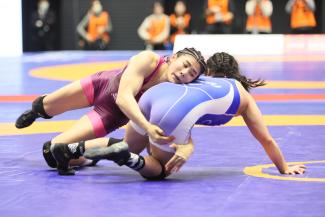
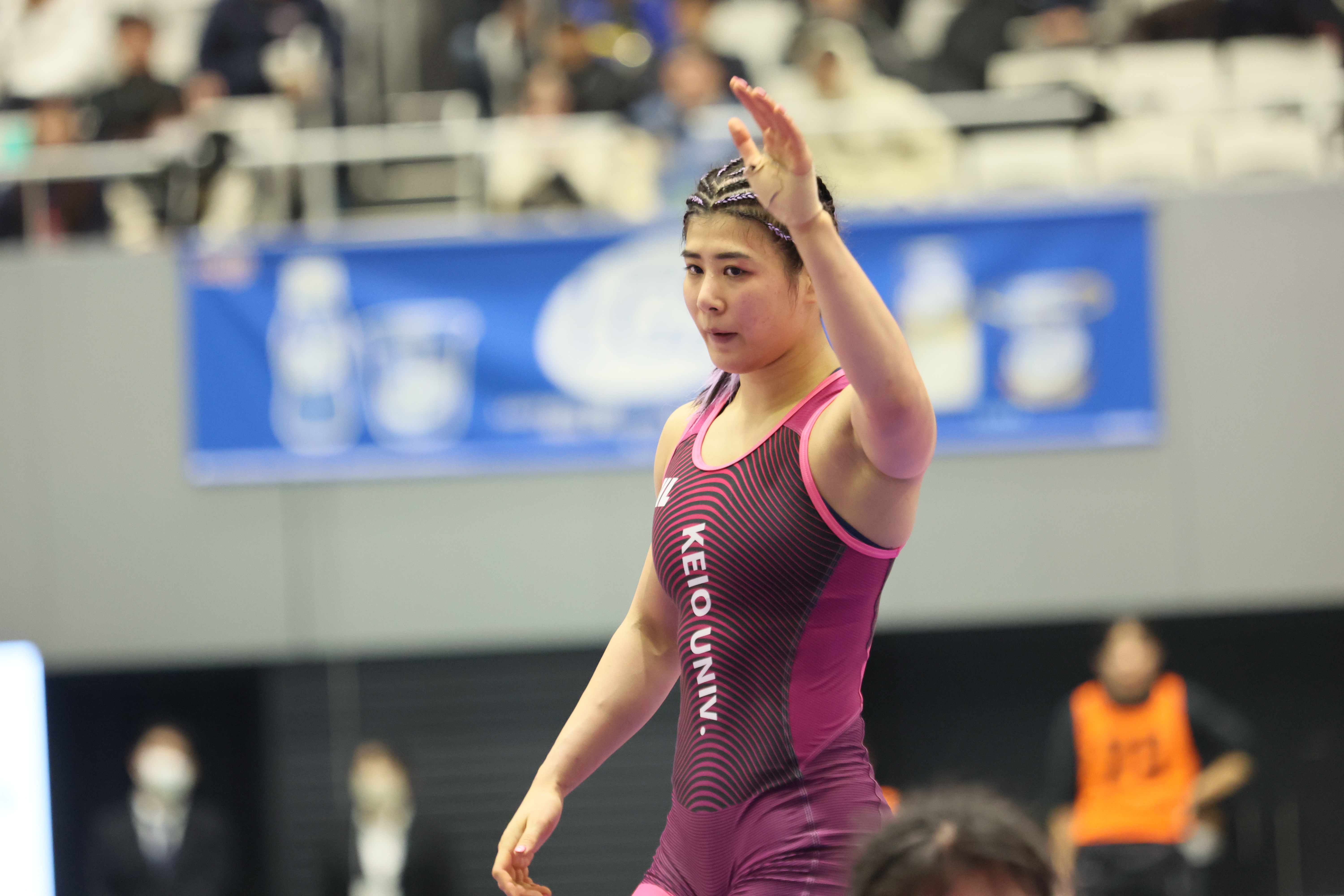 Nonoka OZAKI will wrestle Sakura MOTOKI in the 62kg final. (Photo: Takeo Yabuki / wrestling-spirits.jp)
Nonoka OZAKI will wrestle Sakura MOTOKI in the 62kg final. (Photo: Takeo Yabuki / wrestling-spirits.jp)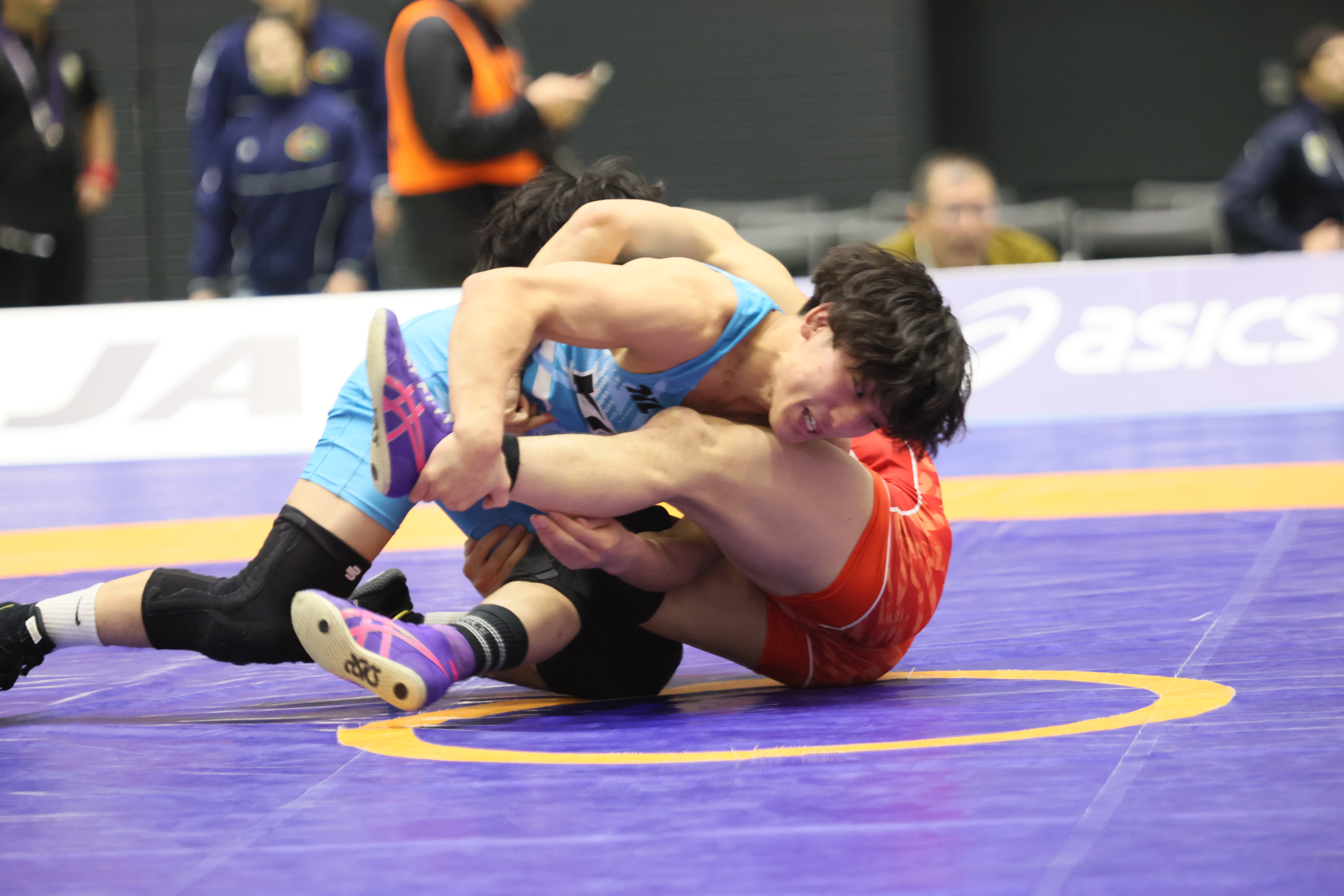 Takara SUDA, left, works for a takedown in the first period against Kaisei TANABE during their 65kg semifinal. (Photo: Takeo Yabuki / wrestling-spirits.jp)
Takara SUDA, left, works for a takedown in the first period against Kaisei TANABE during their 65kg semifinal. (Photo: Takeo Yabuki / wrestling-spirits.jp)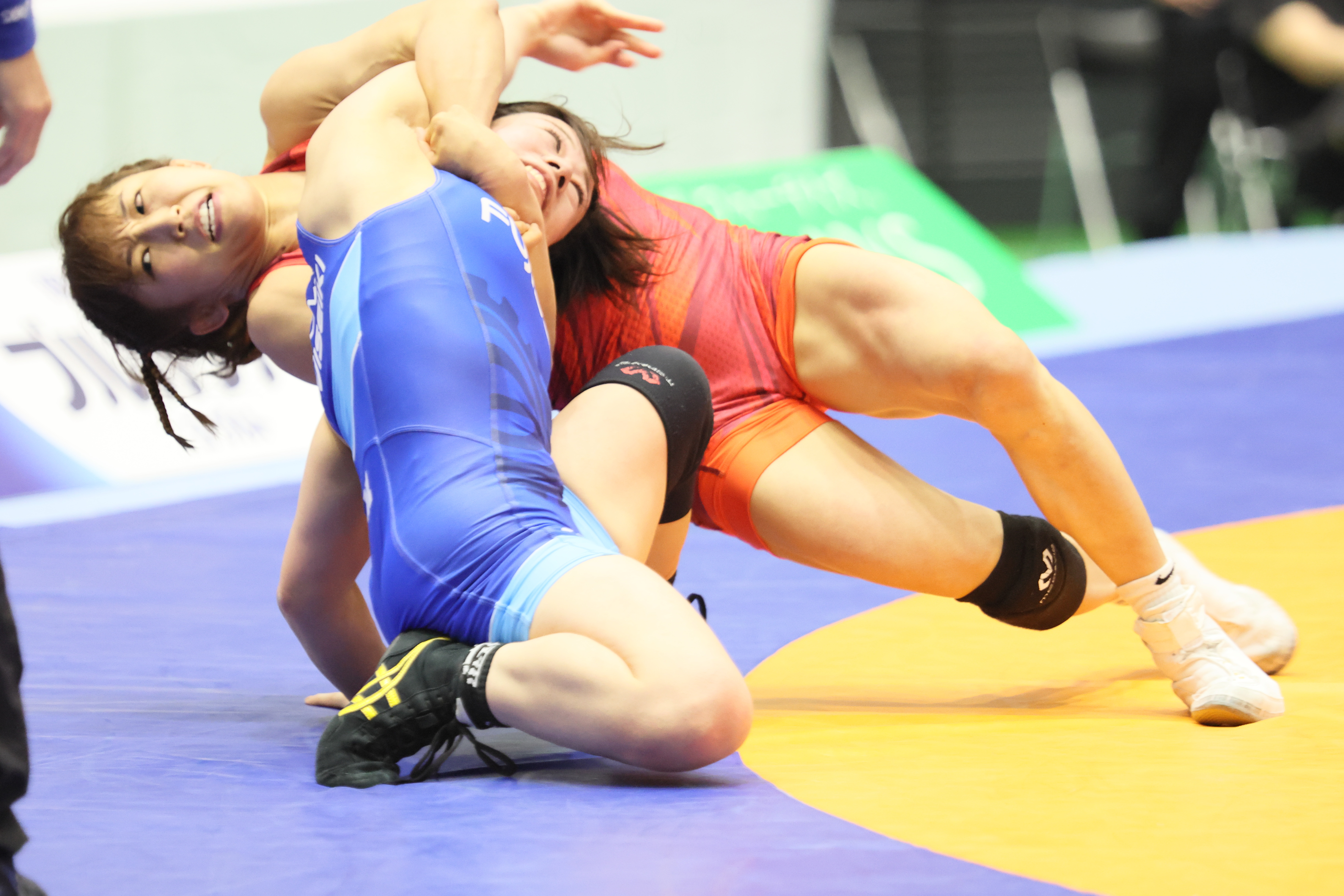 Yui SUSAKI throws Mako ONO en route to a technical fall in their 50kg semifinal. (Photo: Takeo Yabuki / wrestling-spirits.jp)
Yui SUSAKI throws Mako ONO en route to a technical fall in their 50kg semifinal. (Photo: Takeo Yabuki / wrestling-spirits.jp)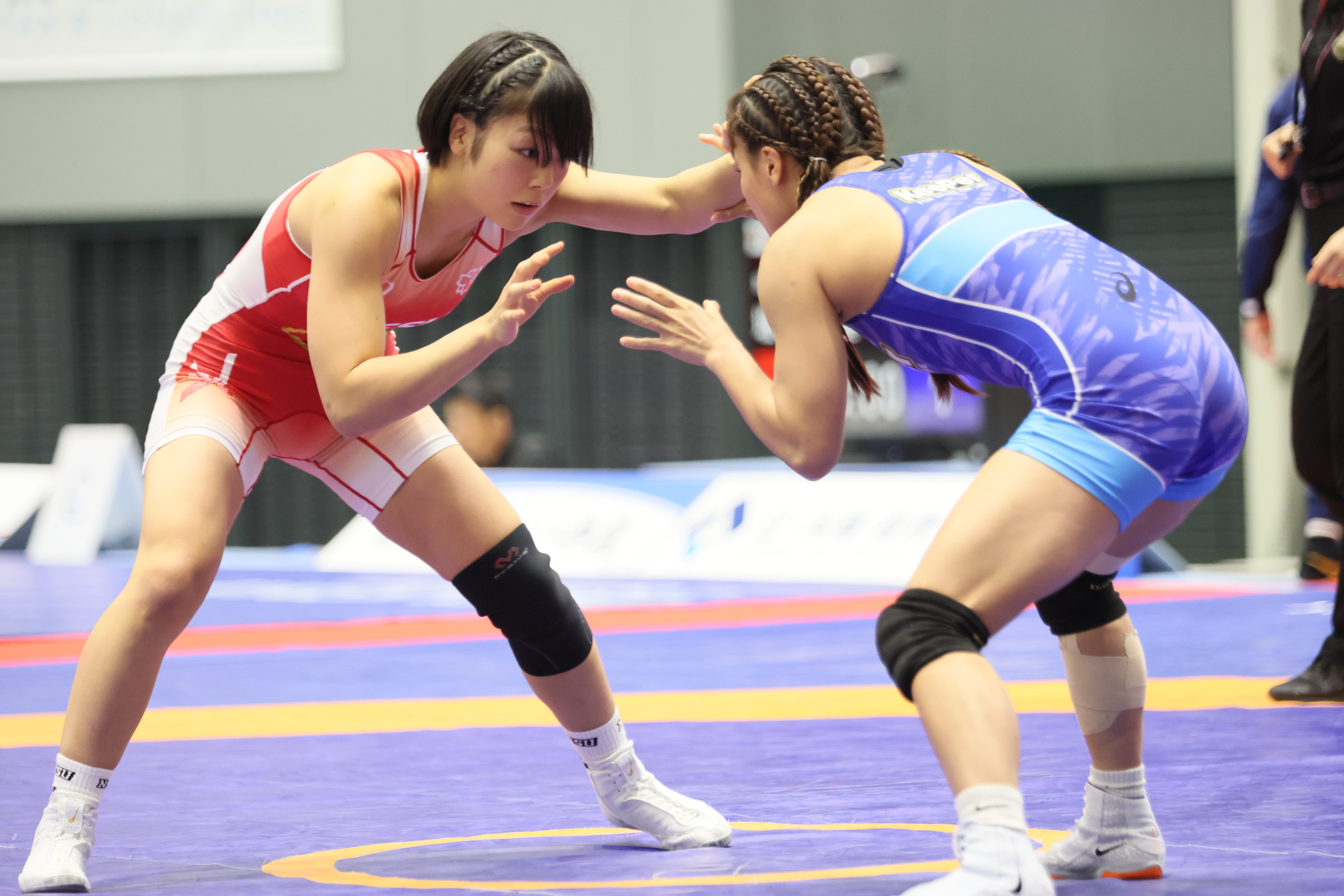 Akari FUJINAMI, left, squares off with Sara NATAMI in the 57kg semifinals. (Photo: Takeo Yabuki / wrestling-spirits.jp)
Akari FUJINAMI, left, squares off with Sara NATAMI in the 57kg semifinals. (Photo: Takeo Yabuki / wrestling-spirits.jp)
Share your thoughts.
Comments